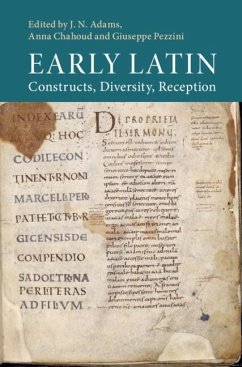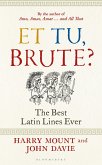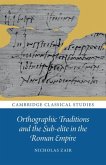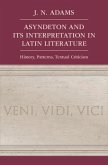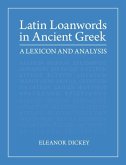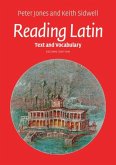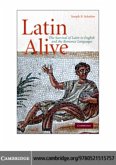Early Latin (eBook, PDF)
Redaktion: Adams, J. N.; Pezzini, Giuseppe; Chahoud, Anna
135,95 €
135,95 €
inkl. MwSt.
Sofort per Download lieferbar

68 °P sammeln
135,95 €
Als Download kaufen

135,95 €
inkl. MwSt.
Sofort per Download lieferbar

68 °P sammeln
Jetzt verschenken
Alle Infos zum eBook verschenken
135,95 €
inkl. MwSt.
Sofort per Download lieferbar
Alle Infos zum eBook verschenken

68 °P sammeln
Early Latin (eBook, PDF)
Redaktion: Adams, J. N.; Pezzini, Giuseppe; Chahoud, Anna
- Format: PDF
- Merkliste
- Auf die Merkliste
- Bewerten Bewerten
- Teilen
- Produkt teilen
- Produkterinnerung
- Produkterinnerung

Bitte loggen Sie sich zunächst in Ihr Kundenkonto ein oder registrieren Sie sich bei
bücher.de, um das eBook-Abo tolino select nutzen zu können.
Hier können Sie sich einloggen
Hier können Sie sich einloggen
Sie sind bereits eingeloggt. Klicken Sie auf 2. tolino select Abo, um fortzufahren.

Bitte loggen Sie sich zunächst in Ihr Kundenkonto ein oder registrieren Sie sich bei bücher.de, um das eBook-Abo tolino select nutzen zu können.
- Geräte: PC
- mit Kopierschutz
- eBook Hilfe
- Größe: 9.99MB
- FamilySharing(5)
Andere Kunden interessierten sich auch für
![Et tu, Brute? (eBook, PDF) Et tu, Brute? (eBook, PDF)]() Harry MountEt tu, Brute? (eBook, PDF)8,95 €
Harry MountEt tu, Brute? (eBook, PDF)8,95 €![Orthographic Traditions and the Sub-elite in the Roman Empire (eBook, PDF) Orthographic Traditions and the Sub-elite in the Roman Empire (eBook, PDF)]() Nicholas ZairOrthographic Traditions and the Sub-elite in the Roman Empire (eBook, PDF)30,95 €
Nicholas ZairOrthographic Traditions and the Sub-elite in the Roman Empire (eBook, PDF)30,95 €![Asyndeton and its Interpretation in Latin Literature (eBook, PDF) Asyndeton and its Interpretation in Latin Literature (eBook, PDF)]() J. N. AdamsAsyndeton and its Interpretation in Latin Literature (eBook, PDF)100,95 €
J. N. AdamsAsyndeton and its Interpretation in Latin Literature (eBook, PDF)100,95 €![Latin Loanwords in Ancient Greek (eBook, PDF) Latin Loanwords in Ancient Greek (eBook, PDF)]() Eleanor DickeyLatin Loanwords in Ancient Greek (eBook, PDF)153,95 €
Eleanor DickeyLatin Loanwords in Ancient Greek (eBook, PDF)153,95 €![Reading Latin (eBook, PDF) Reading Latin (eBook, PDF)]() Peter JonesReading Latin (eBook, PDF)21,95 €
Peter JonesReading Latin (eBook, PDF)21,95 €![Latin Alive (eBook, PDF) Latin Alive (eBook, PDF)]() Joseph B. SolodowLatin Alive (eBook, PDF)22,95 €
Joseph B. SolodowLatin Alive (eBook, PDF)22,95 €![Writing, Society and Culture in Early Rus, c.950-1300 (eBook, PDF) Writing, Society and Culture in Early Rus, c.950-1300 (eBook, PDF)]() Simon FranklinWriting, Society and Culture in Early Rus, c.950-1300 (eBook, PDF)39,95 €
Simon FranklinWriting, Society and Culture in Early Rus, c.950-1300 (eBook, PDF)39,95 €-
-
-
Produktdetails
- Verlag: Cambridge University Press
- Englisch
- ISBN-13: 9781108755122
- Artikelnr.: 68970261
Dieser Download kann aus rechtlichen Gründen nur mit Rechnungsadresse in A, B, BG, CY, CZ, D, DK, EW, E, FIN, F, GR, HR, H, IRL, I, LT, L, LR, M, NL, PL, P, R, S, SLO, SK ausgeliefert werden.
- Herstellerkennzeichnung Die Herstellerinformationen sind derzeit nicht verfügbar.
1. Introduction: What is early Latin? Giuseppe Pezzini and Anna Chahoud
Part I. General (Morphology, Syntax, Lexicon and Metre): 2. Alphabet, epigraphy, and literacy in central Italy in the 7th /5th c. BC Rex Wallace
3. Identifying Latin in early inscriptions Simona Marchesini
4. The Egadi Rostra, a linguistic analysis Wolfgang D. C. de Melo
5. Morphology and syntax in early Latin Wolfgang D. C. de Melo
6. Early Latin metre Wolfgang D. C. de Melo and Giuseppe Pezzini
7. Greek Loanwords in early Latin James Clackson
8. Latin edepol 'by Pollux': background of a Latin aduerbium iuratiuum Brent Vine
9. Indirect questions in early Latin Peter Barrios-Lech
10. Ecquis in early Latin: aspects of questions Colette Bodelot
Part II. Authors and Genres: 11. Support verb constructions in Plautus and Terence José Miguel Baños
12. Early Latin prayers and aspects of coordination James Adams and Veronika Nikitina
13. 'Early Latin' lexicon in Terence (and Plautus) Giuseppe Pezzini
14. Early Latin and the fragments of Atellana Comedy Costas Panayotakis
15. A comparison of the language of comedy and tragedy in early Latin drama Robert Maltby
16. The language of early Latin epic Sander Goldberg
17. How 'early Latin' is Lucilius? Anna Chahoud
18. Repetition in the fragmentary orators: from Cato to C. Gracchus Christa Gray
19. Greek influences on Cato's Latin Neil O'Sullivan
20. Some syntactic features of Latin legal texts Olga Spevak
Part III. Reception: 21. Lucretius and early Latin Barnaby Taylor
22. Cicero and early dramatic Latin Gesine Manuwald
23. Early Latin texts in Livy John Briscoe
24. Pliny rewrites Cato Cynthia Damon
25. Gellius' appreciation and understanding of early Latin Leofranc Holford-Strevens
26. Views on early Latin in grammatical texts Alessandro Garcea
27. Nonius Marcellus and the shape of early Latin Jarrett Welsh
28. Early Latin to Neo-Latin: Festus and Scaliger Anna Chahoud
Conclusions: 29. Early Latin as a Concept James Adams.
Part I. General (Morphology, Syntax, Lexicon and Metre): 2. Alphabet, epigraphy, and literacy in central Italy in the 7th /5th c. BC Rex Wallace
3. Identifying Latin in early inscriptions Simona Marchesini
4. The Egadi Rostra, a linguistic analysis Wolfgang D. C. de Melo
5. Morphology and syntax in early Latin Wolfgang D. C. de Melo
6. Early Latin metre Wolfgang D. C. de Melo and Giuseppe Pezzini
7. Greek Loanwords in early Latin James Clackson
8. Latin edepol 'by Pollux': background of a Latin aduerbium iuratiuum Brent Vine
9. Indirect questions in early Latin Peter Barrios-Lech
10. Ecquis in early Latin: aspects of questions Colette Bodelot
Part II. Authors and Genres: 11. Support verb constructions in Plautus and Terence José Miguel Baños
12. Early Latin prayers and aspects of coordination James Adams and Veronika Nikitina
13. 'Early Latin' lexicon in Terence (and Plautus) Giuseppe Pezzini
14. Early Latin and the fragments of Atellana Comedy Costas Panayotakis
15. A comparison of the language of comedy and tragedy in early Latin drama Robert Maltby
16. The language of early Latin epic Sander Goldberg
17. How 'early Latin' is Lucilius? Anna Chahoud
18. Repetition in the fragmentary orators: from Cato to C. Gracchus Christa Gray
19. Greek influences on Cato's Latin Neil O'Sullivan
20. Some syntactic features of Latin legal texts Olga Spevak
Part III. Reception: 21. Lucretius and early Latin Barnaby Taylor
22. Cicero and early dramatic Latin Gesine Manuwald
23. Early Latin texts in Livy John Briscoe
24. Pliny rewrites Cato Cynthia Damon
25. Gellius' appreciation and understanding of early Latin Leofranc Holford-Strevens
26. Views on early Latin in grammatical texts Alessandro Garcea
27. Nonius Marcellus and the shape of early Latin Jarrett Welsh
28. Early Latin to Neo-Latin: Festus and Scaliger Anna Chahoud
Conclusions: 29. Early Latin as a Concept James Adams.
1. Introduction: What is early Latin? Giuseppe Pezzini and Anna Chahoud
Part I. General (Morphology, Syntax, Lexicon and Metre): 2. Alphabet, epigraphy, and literacy in central Italy in the 7th /5th c. BC Rex Wallace
3. Identifying Latin in early inscriptions Simona Marchesini
4. The Egadi Rostra, a linguistic analysis Wolfgang D. C. de Melo
5. Morphology and syntax in early Latin Wolfgang D. C. de Melo
6. Early Latin metre Wolfgang D. C. de Melo and Giuseppe Pezzini
7. Greek Loanwords in early Latin James Clackson
8. Latin edepol 'by Pollux': background of a Latin aduerbium iuratiuum Brent Vine
9. Indirect questions in early Latin Peter Barrios-Lech
10. Ecquis in early Latin: aspects of questions Colette Bodelot
Part II. Authors and Genres: 11. Support verb constructions in Plautus and Terence José Miguel Baños
12. Early Latin prayers and aspects of coordination James Adams and Veronika Nikitina
13. 'Early Latin' lexicon in Terence (and Plautus) Giuseppe Pezzini
14. Early Latin and the fragments of Atellana Comedy Costas Panayotakis
15. A comparison of the language of comedy and tragedy in early Latin drama Robert Maltby
16. The language of early Latin epic Sander Goldberg
17. How 'early Latin' is Lucilius? Anna Chahoud
18. Repetition in the fragmentary orators: from Cato to C. Gracchus Christa Gray
19. Greek influences on Cato's Latin Neil O'Sullivan
20. Some syntactic features of Latin legal texts Olga Spevak
Part III. Reception: 21. Lucretius and early Latin Barnaby Taylor
22. Cicero and early dramatic Latin Gesine Manuwald
23. Early Latin texts in Livy John Briscoe
24. Pliny rewrites Cato Cynthia Damon
25. Gellius' appreciation and understanding of early Latin Leofranc Holford-Strevens
26. Views on early Latin in grammatical texts Alessandro Garcea
27. Nonius Marcellus and the shape of early Latin Jarrett Welsh
28. Early Latin to Neo-Latin: Festus and Scaliger Anna Chahoud
Conclusions: 29. Early Latin as a Concept James Adams.
Part I. General (Morphology, Syntax, Lexicon and Metre): 2. Alphabet, epigraphy, and literacy in central Italy in the 7th /5th c. BC Rex Wallace
3. Identifying Latin in early inscriptions Simona Marchesini
4. The Egadi Rostra, a linguistic analysis Wolfgang D. C. de Melo
5. Morphology and syntax in early Latin Wolfgang D. C. de Melo
6. Early Latin metre Wolfgang D. C. de Melo and Giuseppe Pezzini
7. Greek Loanwords in early Latin James Clackson
8. Latin edepol 'by Pollux': background of a Latin aduerbium iuratiuum Brent Vine
9. Indirect questions in early Latin Peter Barrios-Lech
10. Ecquis in early Latin: aspects of questions Colette Bodelot
Part II. Authors and Genres: 11. Support verb constructions in Plautus and Terence José Miguel Baños
12. Early Latin prayers and aspects of coordination James Adams and Veronika Nikitina
13. 'Early Latin' lexicon in Terence (and Plautus) Giuseppe Pezzini
14. Early Latin and the fragments of Atellana Comedy Costas Panayotakis
15. A comparison of the language of comedy and tragedy in early Latin drama Robert Maltby
16. The language of early Latin epic Sander Goldberg
17. How 'early Latin' is Lucilius? Anna Chahoud
18. Repetition in the fragmentary orators: from Cato to C. Gracchus Christa Gray
19. Greek influences on Cato's Latin Neil O'Sullivan
20. Some syntactic features of Latin legal texts Olga Spevak
Part III. Reception: 21. Lucretius and early Latin Barnaby Taylor
22. Cicero and early dramatic Latin Gesine Manuwald
23. Early Latin texts in Livy John Briscoe
24. Pliny rewrites Cato Cynthia Damon
25. Gellius' appreciation and understanding of early Latin Leofranc Holford-Strevens
26. Views on early Latin in grammatical texts Alessandro Garcea
27. Nonius Marcellus and the shape of early Latin Jarrett Welsh
28. Early Latin to Neo-Latin: Festus and Scaliger Anna Chahoud
Conclusions: 29. Early Latin as a Concept James Adams.
